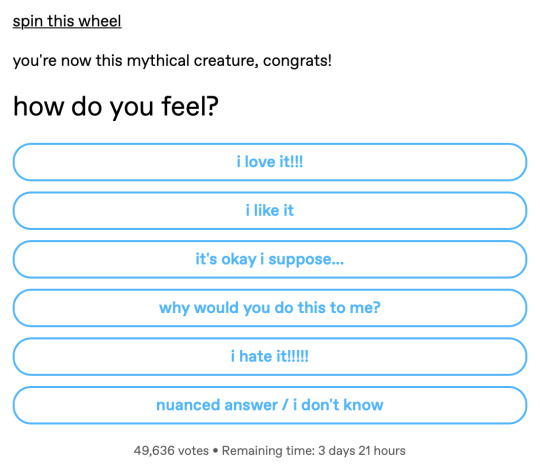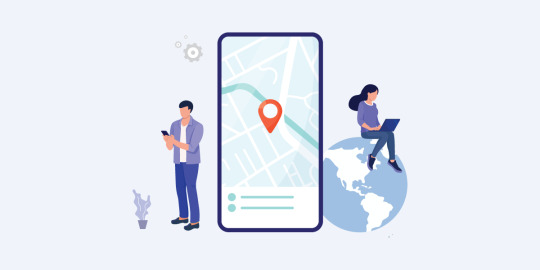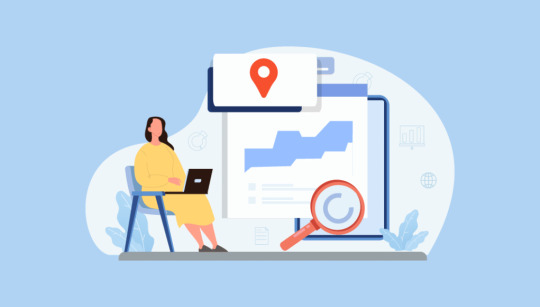#IP Address Locator
Explore tagged Tumblr posts
Text
#test my Microphone#Image Resizer#HTML Table Generator#IP Address Locator#Table to Div Convertor#Word/Char Counter#HTML Color Code#HTML to PHP Convertor#Image Color Picker#Test my Bluetooth MIC#Password Generator#Text Case Changer#Check my Webcam#User Agent Finder#Tip Calculator#Age Calculator#Binary HEX Convertor#QR Code Generator#Color to Black & White Image Convertor#webtools#seo#coding#seo services
1 note
·
View note
Text
so you've probably been warned against clicking strange links and to especially avoid revealing your personal information online, even in "private" accounts. But what about a "cute" spin-the-wheel link above a tumblr poll?? (like the post in the following screenshot)

FYI: getting people to click an external link is a great strategy for gathering more details about a mostly anonymous user in a forum or tumblr or wherever. Here's some reasons why: 1. If you shared a unique link in a restricted forum or channel or community or chatroom or public fandom blog or at the end of a fic on ao3, you can be sure only the people of interest could click on it 2. That URL could lead to fucking anything of their choosing. Do they want to do an intensive browser fingerprint or get a log of IP addresses? Do they want to estimate the hardware specs of everyone's machines? Do they want to try loading other things on the page to test for adblockers or other blacklists? (an additional kind of profiling) 3. People LOVE to give away identifying information for the sake of a poll or cute name generator. Here are some questions I've seen recently and what information it can point to: - First anime? (fuzzy proxy for age and country) - First celebrity crush? (fuzzy proxy for age and country) - First album? (fuzzy proxy for age and country) - First name using first letter of last name, Last name using birthday month (do I need to spell this out? last name and birthday month) - What word do you use for [common item]? (region, language, culture, class) - Getting people to talk about astrology (you've all given away your birth month for free, wtf) Another fun fact about "Spin The Wheel" links: they can generate ad revenue for someone! Fun fact about Quizzes: they can help build deeper advertising profiles for linkbait sites like facebook or buzzfeed or the daily mail or tmz Another fun fact: besides the info the Spin The Wheel or Name Generator pages save direct to the server, the page can encode that information back into where the wheel stops or the name it gives you. That makes it easier to gather information because it's recorded 1st on the server (controlled by person fishing to unmask someone) 2nd back in the post notes or in the discord channel or wherever. And we all know how much people want to gab about the Fun poll or survey or quiz and reveal even more information. Another fun fact about Spin the Wheel or Name Generator or Quiz pages: You might be seeing a list of options nobody else saw that only appear for IP addresses from a certain region! And if you post your result (that would be mostly unique) it's an INSTANT indication that the person from [region] is logged in. (same goes for browser fingerprint - which device a certain person has) I remember a line from an article about digital detectives (I think it was feds tracking dark web stuff), it said they wait for YEARS for someone to post or log in just to confirm a person of interest was in a certain place at a certain time. You and I probably don't remember the information we leaked years and years ago in the notes of a post or on a retweet of some idiot, but any people who might want to figure you out probably have a huge spreadsheet with everything recorded. They can and do analyze and annotate it all, and can start to narrow down where you are, how old you are, your interests, hobbies, class background, devices you use etc. You might be thinking: "but I don't worry about federal agents or intelligence agencies, why do I care?" What if tomorrow your post goes viral, truly globally Viral? You can go from tumblr nobody to target for stalkers and/or hate crimes instantly. An even more serious example from this year: What if you've been advocating for years for people that are now scapegoat of the day for the fascists? What if a federal agent is tasked with creating a list of "those people" for surveillance? The less information you have unintentionally posted about yourself the better. A perhaps more personal and private example: what if you had to get away from a city or country or person or persons or family and didn't want them to follow you? People with a grudge will go to great lengths to get back at someone
#privacy online is bigger than direct reveals of the big details like dob or location#gotta be careful#some people make it their life's work to tease out key information without you ever noticing - they're experts#be cautious and wary out there#you don't know who's reading your posts or sharing your dms or charting your ip addresses#my blog#digital privacy
32 notes
·
View notes
Note
Question but wtf happened with Ziz?
Deactivated I guess!
#if you're asking about what happened in regards to me#I made a post directed at no one about how no one needs to credit anyone for infoposts because the information doesn't belong to anyone#and that pissed them off so they started a reblog chain arguing with me about it for some reason#which is really quite futile because I don't know how you think you can argue against 'information doesn't belong to anyone' but alright#then they falsely admitted they were cyberstalking me with my ip address somehow (because that's a normal thing to do)#which is also not possible mind you#I asked for my ip on multiple occasions. i would be content even with them posting ''my ip'' in complete public. who gives a fuck. That's#how confident I am they never had anything of the sort hah#But even if they did don't be intimidated if someone tells you they have your ip address because it does nothing and means nothing#oh no not my general location! and isp! what will I do now!?!?#Okay that's probably the last I'll say about all of that I hope
4 notes
·
View notes
Text
I can't do this because I guessed wrong once and felt really bad, and also because of VPNs and such but sometimes when I get anon hate I check statcounter and the most likely option for it is someplace that, personally, sounds miserable to live in and I'm just like you know what, I shall block this IP and you can endlessly scream into my inbox as restitution for the fact that you live in what I would consider the nine hells.
#(haven't gotten anon hate in a while i was looking through drafts and saw that I had a sus IP address and location saved)#and was just like. man. i've been there for an interview and i could not leave fast enough.
9 notes
·
View notes
Text
Just saw someone tag a post with a cranefly with "kill on sight" girl it's a cranefly it literally cannot hurt you.
#instant block#blocked. unfollowed. searching your ip address. cancelling you on twitter.com. alerting the kpoppies of your location.
2 notes
·
View notes
Text
Ip Address To Country Api | Location Lookup Api | DB-IP

DB-IP offers reliable IP address to country API solutions that help businesses identify user locations accurately in real time. This powerful tool enhances geo-targeting, fraud prevention, and analytics. With fast and scalable integration, DB-IP provides data you can trust. The location lookup API goes beyond basic IP data by offering detailed insights like city, region, and timezone. Whether you're optimizing content delivery or improving security, DB-IP’s APIs deliver precise location intelligence for smarter online operations.
0 notes
Text
yeah yeah sampling bias whatever but what i'm interested in is how @staff is purporting to know the numbers. it's not like you tick a box when you sign up
going based on the content you post/engage with is... literally just guessing. twitter thought i was straight and facebook thinks i'm a lesbian despite being in a relationship with a man. it's a guess and not a very good one.
were the bots excluded from those numbers? what about inactive blogs
etc etc etc
With @staff 's recent post saying 1/4 of this site is LGBTQ going around, I'd like to see what the actual demographic is
So!
Please reblog for bigger sample size!
#'staff have the data they would know' they don't though#the only actual data they actually have is age and geographic location#assuming you didn't lie about your age and don't hide your IP address#twitter used the data to surmise i was a middle aged straight man for gods sake#when they had ACTUAL data to the contrary#let's not pretend they understand any of the data they collect#spotify serves me ads localised to england. they have my actual address. in not england#yes this poll is very inaccurate. but i'd wager no more inaccurate than staff's Uneducated Guess lmao
71K notes
·
View notes
Text
Made something…

#meme#did this actually work?#no#BUT#that’s only because the release had a specific date :)#also I’m not tech savvy enough to chance my IP address of my WiFi (yes it uses that to locate you also)#I feel if the IP address of the connected WiFi is signaling for Australia AND I put my Xbox on Australian time#turn off roaming#cuz I’m 65% sure that has to do with communicating with other devices in the vicinity#and if every other device is still in America it will still think your lying#while if you google it#it says it no work no more#I think they just want us to believe that#when in REALITY#we just have to gaslight harder#lie better#and soon we can ALL#live in Australia#which also happens to be a day behind :)
0 notes
Text
0 notes
Text
About twenty years back, there was this weird transitional period after companies had figured out that harvesting their users' demographic information was a potential gold mine but before we lived in a hellish panopticon where any website operator could look up your IP address and know what you had for breakfast where some sites would try to get you to fill out, like, detailed demographic surveys before they'd let you access their stuff. Not just age, gender and geographic location, either – some of them would fish for employment status, marital status, brand preferences, even religious affiliation. A lot of folks I knew would just pick the first option in every dropdown, but my move was always to fill in the demographic information of the current Pope, at least as far as I was able to determine it (brand preference was always a tricky one). I like to think that, thanks to my efforts, their data sets are haunted to this day by a phantom pontiff.
#life#computers#internet#history#nostalgia#capitalism#food mention#religion mention#christianity mention#catholicism mention#hovering my mouse over the checkbox in an agony of indecision as i internally debate whether the pope knows what pringles are
8K notes
·
View notes
Text
u ever think how orin would take 'rearrange my guts' at face value
1 note
·
View note
Text
Does Changing IP Address Affect SEO?
Changing your IP address does not directly affect SEO. While your IP address does play a role in SEO, it is not the determining factor.
To give you more information, let's go deeper.
Changing IP Address and SEO Relationship:
1. Search engines like Google primarily focus on the content and relevance of your website when ranking it in search results. They do not consider the IP address as a ranking factor.
However, there are a few indirect ways in which changing your IP address can impact your SEO efforts.
2. One potential impact is related to website speed. Search engines take into account the loading speed of your website when determining its rankings.
If you change your IP address and switch to a different hosting provider or server, it may affect the speed at which your website loads.
Slow loading times can negatively impact user experience and ultimately result in lower rankings.
3. Another aspect to consider is geolocation. Search engines take into account the location of the user when determining the relevance of search results.
If you change your IP address and thereby change your server location, it may affect the geolocation signals that search engines use to determine the relevance of your website for specific searches.
This could potentially impact your rankings for location-specific searches.
4. Moreover, changing your IP address frequently or engaging in manipulative practices, can be seen as suspicious by search engines.
They may interpret such behavior as an attempt to deceive or manipulate their algorithms, which can lead to penalties and a decline in rankings.
In conclusion, changing your IP address does not directly affect SEO. However, it can indirectly impact factors such as website speed and geolocation signals, which in turn can influence your rankings.
It's important to ensure that any changes to your IP address are done for legitimate reasons and do not involve manipulative practices that could harm your SEO efforts.
Here's related information that might also be useful to you – Does web hosting affect SEO?
0 notes
Text
Athena, watching her “Warrior of the mind” give his IP address, passport information, location, full name, and serial code

5K notes
·
View notes
Text
The Future of Geolocation by IP Address: Trends and Innovations
Geolocation by IP address has come a long way since its inception, and it continues to evolve rapidly, shaping the digital landscape in profound ways. In this article, we'll delve into the latest trends and innovations in geolocation technology, highlighting how it is poised to impact various industries in the coming years.

1. Enhanced Precision with 5G
The rollout of 5G networks is poised to revolutionize geolocation accuracy. With its higher bandwidth and lower latency, 5G will enable more precise location tracking, particularly in urban environments. This technology will not only benefit navigation and logistics but also enhance augmented reality (AR) and virtual reality (VR) experiences, making them more immersive and location-aware.
2. IoT and Geofencing
The Internet of Things (IoT) is creating new opportunities for geolocation applications. Geofencing, a technique that establishes virtual boundaries around physical locations, is becoming increasingly popular. IoT devices equipped with geolocation capabilities can trigger actions or notifications when they enter or exit predefined areas. This is being used in logistics to track shipments, in smart homes for security and automation, and even in marketing to send location-based offers to consumers.
3. Indoor Geolocation
While GPS is effective outdoors, it falls short when it comes to indoor locations. Innovations in indoor geolocation technologies, such as Bluetooth beacons and ultra-wideband (UWB) technology, are addressing this limitation. Indoor geolocation is revolutionizing industries like retail, healthcare, and hospitality by enabling personalized experiences, asset tracking, and improved navigation within large buildings.
4. Geospatial Data Fusion
The integration of various data sources is enhancing the accuracy and utility of geolocation information. Combining GPS data with data from Wi-Fi networks, cell towers, and sensors allows for more reliable and precise location determination. This fusion of data is particularly valuable in urban environments with complex infrastructure.
5. Privacy-Preserving Geolocation
As concerns about privacy grow, there is a growing emphasis on privacy-preserving geolocation solutions. Techniques such as differential privacy and on-device processing are being employed to ensure that user location data remains confidential while still enabling valuable geolocation-based services. Striking the right balance between convenience and privacy will be crucial in the future of geolocation.
6. Geolocation in Healthcare

Geolocation technology is making significant inroads into the healthcare sector. Wearable devices with built-in geolocation capabilities can track patients' movements and vital signs in real-time, facilitating remote monitoring and emergency response. Additionally, geolocation can assist in contact tracing during pandemics, helping to curb the spread of infectious diseases.
7. Geolocation in Autonomous Vehicles
The automotive industry is leveraging geolocation technology to advance the development of autonomous vehicles. Precise and real-time geolocation data is critical for self-driving cars to navigate safely and efficiently. These vehicles rely on a combination of GPS, lidar, radar, and high-definition maps to make split-second decisions on the road.
8. Geolocation and Augmented Reality
Augmented reality (AR) is poised to benefit greatly from geolocation capabilities. AR apps can overlay digital information onto the physical world, and accurate geolocation data is crucial for aligning virtual objects with the real environment. This synergy is opening up new possibilities in gaming, tourism, education, and urban planning.
9. Climate and Environmental Monitoring
Geolocation API technology plays a pivotal role in climate and environmental monitoring. Satellites equipped with geolocation instruments provide valuable data for tracking changes in the Earth's climate, deforestation, and disaster management. Geolocation also aids in precision agriculture by enabling farmers to optimize resource usage based on location-specific data.
10. Geolocation in Smart Cities

Smart city initiatives are utilizing geolocation to improve urban planning and services. Real-time data from sensors and geolocation-enabled devices can optimize traffic management, waste collection, and energy usage. Additionally, geolocation can enhance public safety by enabling quicker emergency response and evacuation planning.
In conclusion, geolocation by IP address is on a trajectory of continuous growth and innovation. From the enhanced precision of 5G to the rise of indoor geolocation and privacy-preserving solutions, this technology is becoming increasingly integral to our digital lives. As geolocation continues to evolve, it will empower industries across the board, improving user experiences, enhancing safety and security, and contributing to a more connected and efficient world. Keeping an eye on these trends and innovations will be essential for businesses and individuals alike as we embrace the future of geolocation.
0 notes
Note
Reading your post about safe anonymous leaking and nodding along and then going "well fuck I hope I can remember this later because if I ever consider it this is a bit incriminating to save in any way, huh"
The more people who use Tor, the less incriminating it is to use Tor.
The more you use things like Tor, the less weird it is for you to use signal and encrypted email services.
The more you use things like Tor and signal and encrypted email, the less weird it is for you to turn off the location on your devices and leave your phone at home when you go out.
It's suspicious as hell if you make a signal account the week before documents get leaked from your workplace. But it's not suspicious to have a signal account.
It's suspicious if you try to delete your google maps history the week after a protest. It's not suspicious if you don't have a google maps history because you don't use google maps.
All of which is to say: I don't think it's incriminating to check in on that post or bookmark it or start doing the things that it recommends because people should be doing the things on that post anyway. We should be using Tor casually. You should have a half dozen or so proton accounts just for convenience's sake. You should have signal, you should have your location turned off on your devices. You should be doing those things because they are good things to do, but doing those things also sets up an environment in which certain behaviors are less likely to be incriminating, or are less likely to be effective correlative evidence.
But also it has probably been a while since we talked about security nihilism around here; the deal is we live in a surviellance state and all of us are burned in some way. You sent an anon ask, but unless you sent it logged out and through an anonymizing tool, someone knows the originating IP address. If you sent it logged in, you may as well bookmark the post because you have already "contacted a security activist" in a way that can be subpoenaed (anon is only anon to the recipient! it is not anonymous to tumblr and courts can demand their records! that is why I said in the post that nobody who wanted to do any kind of leaking should say anything to me off or on anon!)
But also, consider your source: I have a bookmarks folder called "anarchist resources" that I had to remove from the toolbar because clients kept commenting on it during work calls. There is no way I'm beating the allegations.
But! Nihilism! If they want to charge you bad enough they won't need evidence to make it stick! So you might as well bookmark the post and install signal anyway. At least you can see if you can reduce your chances of getting caught!
1K notes
·
View notes
Text
IP to City Lookup: Why It Matters for Business

IP to city lookup is a powerful tool that enables businesses to identify the precise location of their website visitors, down to the city level. This geographic insight is crucial for personalizing content, targeting regional marketing campaigns, and improving user experience. By integrating an advanced IP address location Api, companies can access real-time, accurate data that drives smarter decisions. Understanding user location through IP-to-City lookup optimizes ad delivery and helps prevent fraud, giving your business a competitive edge in today’s digital landscape.
Read More:- https://archieheaton.com/ip-to-city-lookup-why-it-matters-for-business/
0 notes